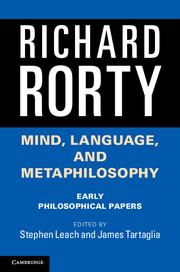Book contents
- Frontmatter
- Contents
- Foreword
- Acknowledgments
- Introduction
- 1 Pragmatism, categories, and language
- 2 The limits of reductionism
- 3 Realism, categories, and the “linguistic turn”
- 4 The subjectivist principle and the linguistic turn
- 5 Empiricism, extensionalism, and reductionism
- 6 Mind-body identity, privacy, and categories
- 7 Do analysts and metaphysicians disagree?
- 8 Incorrigibility as the mark of the mental
- 9 Wittgenstein, privileged access, and incommunicability
- 10 In defense of eliminative materialism
- 11 Cartesian epistemology and changes in ontology
- 12 Strawson’s objectivity argument
- 13 Verificationism and transcendental arguments
- 14 Indeterminacy of translation and of truth
- 15 Dennett on awareness
- 16 Functionalism, machines, and incorrigibility
- Index of names
- References
14 - Indeterminacy of translation and of truth
Published online by Cambridge University Press: 05 June 2014
- Frontmatter
- Contents
- Foreword
- Acknowledgments
- Introduction
- 1 Pragmatism, categories, and language
- 2 The limits of reductionism
- 3 Realism, categories, and the “linguistic turn”
- 4 The subjectivist principle and the linguistic turn
- 5 Empiricism, extensionalism, and reductionism
- 6 Mind-body identity, privacy, and categories
- 7 Do analysts and metaphysicians disagree?
- 8 Incorrigibility as the mark of the mental
- 9 Wittgenstein, privileged access, and incommunicability
- 10 In defense of eliminative materialism
- 11 Cartesian epistemology and changes in ontology
- 12 Strawson’s objectivity argument
- 13 Verificationism and transcendental arguments
- 14 Indeterminacy of translation and of truth
- 15 Dennett on awareness
- 16 Functionalism, machines, and incorrigibility
- Index of names
- References
Summary
There are three theses connected with Quine’s views about the indeterminacy of translation which should be clearly distinguished from one another. These are:
(1) A person’s dispositions to accept sentences do not determine a unique interpretation of those sentences.
(2) The notions of meaning, propositional attitudes, etc., do not possess the explanatory power often attributed to them by philosophers. (In particular, one cannot explain the truth of a sentence by saying it is “true by virtue of meaning,” nor can one “explain why a person accepts a sentence by saying he accepts a proposition which the sentence expresses.”)
(3) “Though linguistics is of course a part of the theory of nature, the indeterminacy of translation is not just inherited as a special case of the underdetermination of our theory of nature. It is parallel but additional.”
I doubt that (1) is still a subject of debate. Quine’s opponents have by now been argued around to admitting that alternative systems of analytical hypotheses, producing non-equivalent translations, will predict dispositions to accept sentences equally well. (2) is a much more important, interesting, and controversial matter, and one which requires more argument than merely citing (1). The arguments for (2) consist mainly in exhibiting the poverty of the “explanations” provided by an appeal to the notions in question. (3) is often run together with (2). Thus, when replying to Chomsky’s doubts about (3) Quine himself seems to merge the two theses by saying that grasping the difference between the general “under-determination of our theory of nature” and the special indeterminacy of translation will lead to “a change in prevalent attitudes toward meaning, idea, proposition,” and that the difference escapes recognition “because of the uncritical persistence of old notions of meaning, idea, proposition.” The suggestion seems to be that accepting (2) should lead to accepting (3), or vice versa, or both.
Information
- Type
- Chapter
- Information
- Mind, Language, and MetaphilosophyEarly Philosophical Papers, pp. 271 - 289Publisher: Cambridge University PressPrint publication year: 2014
References
Accessibility standard: Unknown
Why this information is here
This section outlines the accessibility features of this content - including support for screen readers, full keyboard navigation and high-contrast display options. This may not be relevant for you.Accessibility Information
- 2
- Cited by
